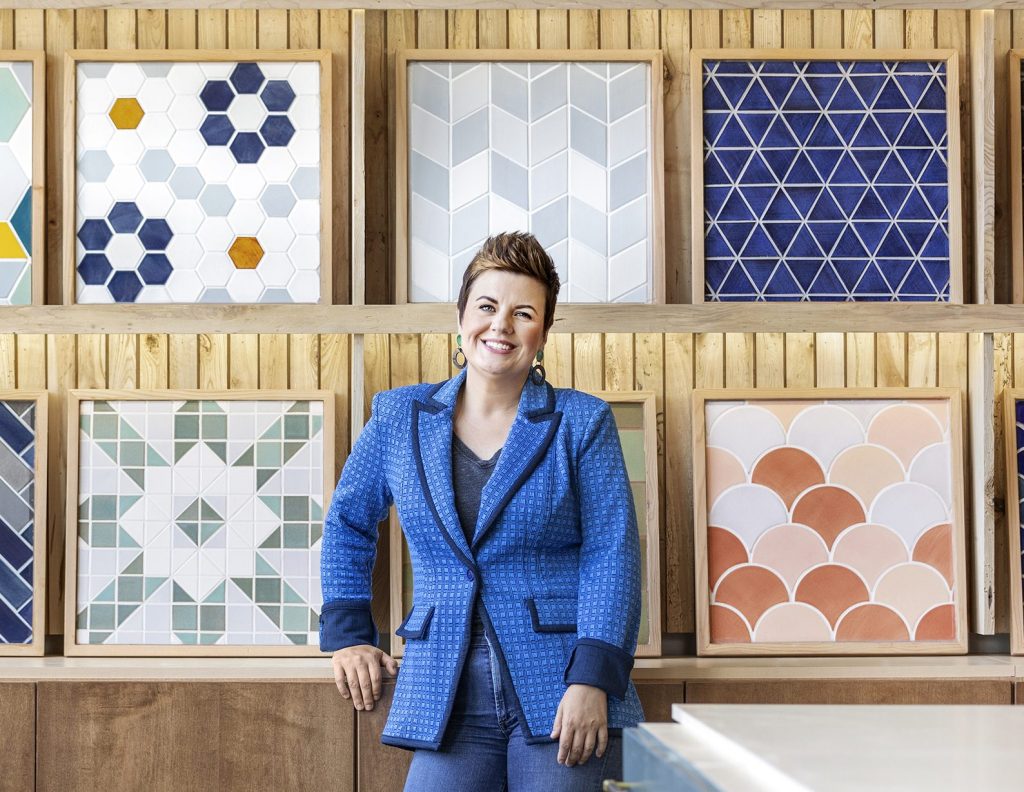Mercedes Austin launched Mercury Mosaics in 2002, partly as a means to support her artistic pursuits but also to create a supply chain of high-quality handmade tiles specifically for mosaic art. Fast forward two decades: Austin has grown Mercury Mosaics to more than $3.5 million in annual revenue, 34 employees and a cadre of “studio pups” that serve both residential and commercial customers, including Disney and Lululemon.
The company is headquartered in northeast Minneapolis, where it maintains a design studio, support offices and a manufacturing studio for custom products. It also has a 20,000-square-foot facility in Wadena, Minnesota, which makes its ready-to-ship products. All tiles created by its artisan team are are hand-brushed and use nontoxic clay and lead-free glazes.
“It’s often a common perception that if an artist leans into industrial design, then they’ve sold out creatively,” Austin says. “Yet business and art are not separate. You have to strike a balance between the two, and business is something that can grow and thrive when you respect it.”

With growth in mind, Austin participated in CEO Next Business Institute, a regional partnership spearheaded by Hennepin County. (In recent years, Carver, Dakota, Ramsey and Scott counties have been involved as well.) The program targets second-stage business owners — those with 10-99 employees and $1 million to $50 million in annual revenue — who are looking to scale their companies. The three-tiered program combines networking forums with monthly CEO roundtables and customized strategic research.
Although Austin has been involved in other business assistance programs, CEO Next marked her first time in a facilitated roundtable. “In particular, there were two members who were extremely growth-oriented and inspiring,” she says. “It was great energy to be around.” She also praises her facilitator for his objectivity and ability to pose questions that stimulated productive conversations.
For Austin, the roundtables became especially valuable during the early months of the pandemic. “I wasn’t alone on an island navigating through that,” she says. “When going through a crisis, it’s helpful to understand how other people are responding to it — to have a collective group to share best practices and troubleshoot.
Austin was in the process of establishing her Wadena facility when the pandemic began. “The roundtable created a good place for me to be accountable and not abandon my plans and vision,” she says. “Even though timelines were delayed, I was able to keep things going.” Indeed, Mercury Mosaics was able to begin production in Wadena in spring 2021.
The CEO Next program also enabled Austin to tap subject-matter experts in the System for Integrated Growth (SIG). In particular, a SIG expert on geographic information systems identified high-potential markets and prospective customers to target based on demographic and psychographic profiles of Mercury Mosaics’ current clientele.
Austin has leveraged the SIG research to help launch a new product line of ready-to-ship mosaic wall art. She’s also using it to develop a sister brand, Mosaic Candy Shop, which will enable consumers to buy affordable, yet high-design mosaic kits for creating home accessories. In addition to isolating which existing customers will be the best targets for Mosaic Candy Shop, the research helped identify marketing channels to reach them.
Other takeaways from CEO Next program include:
- Delegating more responsibility to her staff so she can focus on strategy.
- Hearing how other business owners define success.
“It’s very important to be around other entrepreneurs who are creating and scaling,” says Austin.
(Published June 12, 2023)
